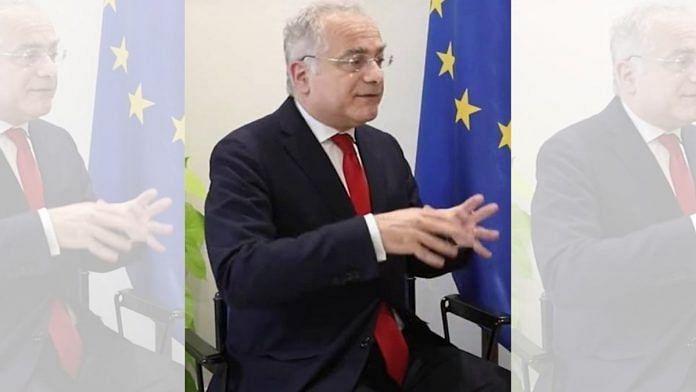New Delhi: In Europe, the era of Russian fossil fuels is over, European Union (EU) Ambassador to India, Ugo Astuto, has said in an exclusive interview with ThePrint, adding that India will benefit from mechanisms like the G7 oil price cap which seek to ensure stability in global oil prices.
With the war in Ukraine nearing the one year-mark, the G7 is reportedly planning to introduce two more price caps on Russian refined products next month.
On how future price caps may affect India, the EU ambassador said, “We are no longer importing seaborne Russian crude oil. In Europe, the era of Russian fossil fuels is over, but we also have a stake in ensuring global stability of [oil] prices, and that’s the point of the price cap.”
Astuto added that the EU believes India, besides other partners in the Global South, will also benefit from these mechanisms.
The phrase “Global South” mainly refers to developing nations in regions like Latin America, Asia, Africa, and Oceania.
On 5 December last year, the G7 and EU implemented a price cap on Russian seaborne oil at $60 per barrel. Hardeep Singh Puri, minister of petroleum and natural gas, subsequently indicated that the price cap would not affect India.
India’s imports of Russian crude oil have risen sharply since the war in Ukraine broke out, so much so that Moscow has surpassed Saudi Arabia to become India’s second-largest supplier of crude. Though the EU has initiated a ban on Russian crude, supplies flowing via the Druzhba pipeline to eastern Europe are exempt and large imports of Russian LNG continue.
The EU ambassador also spoke at length with ThePrint about the possibility of future G7 price caps, India’s ‘Voice of Global South’ Summit initiative as G20 chair, the India-EU free trade agreement (FTA) talks, and more.
Also Read: India invites 120 nations to G20 plus summit to discuss debt traps & other concerns
‘Need to isolate Russian leadership’
Earlier this month, External Affairs Minister (EAM) S. Jaishankar asserted that since February 2022, Europe has imported six times the amount of fossil fuel energy from Russia than that imported by India.
The Indian government has repeatedly defended its oil trade with Russia.
Asked if India has effectively walked the tightrope of being G20 chair and its criticism over energy imports from Moscow, Astuto said, “We cannot say that we are in a ‘business as usual’ situation. The Russian aggression against Ukraine is a blatant violation of international law.”
He underlined the need to isolate the Russian leadership and “to take into account the facts on the ground”.
‘India, EU on same page on Global South’
From 12-13 January, India hosted the virtual ‘Voice of Global South’ Summit which sought to be a platform for developing countries to air concerns and suggestions that can be inculcated into discussions at the G20 forum.
Astuto expressed support for the initiative, adding that the EU is on the “same page” as India when it comes to addressing concerns of the Global South. “The European Union has for long been advocating for focus on the needs of the Global South,” he said, citing the particular focus on Africa during the German G20 presidency in 2017 as an example.
“We agree on the need to work for a sustainable, inclusive and green growth which leaves no one behind. We are on the same page as India when it comes to paying particular attention to the Global South,” added Astuto.
The Voice of Global Summit saw the participation of 125 countries, including 47 from Africa, 7 from Europe and 29 from Latin America and the Caribbean. China was not invited, however, a statement by the Chinese foreign office indicated that India had informed Beijing of the initiative.
‘Strong political mandate for FTA with India’
Last June, India and the EU formally relaunched negotiations toward a free trade agreement, after nearly a decades-long pause in talks. Three rounds of negotiations have taken place since and, according to Astuto, a fourth is scheduled to be held in Europe in March.
Sweden, which has taken up the Presidency of the EU Council, has indicated that wrapping up an FTA with India will be one of its priorities. The FTA is expected to be finalised before 2024.
“There is a very strong political mandate from all EU member states,” Astuto said. He added, “The negotiation is complex. There is no point in hiding it. The FTA is broad and ambitious but it’s worth pursuing.”
Asked about sticky issues like intellectual property (IP) rights and data security, he told ThePrint, “Both sides are working hard to achieve results. The atmosphere is constructive.”
With strains on global supplies of food, fertiliser and fuels, a number of countries in the West are currently facing global recessionary trends.
“One third of the world is technically in recession. When it comes to India, there are risks but the Indian economy has strong fundamentals…,” he said.
Last week, the World Bank said India is expected to be the fastest growing of the seven largest emerging markets and developing economies, despite its economic growth projected to slow down to 6.9 per cent in FY23 and 6.6 per cent in FY24 from 8.7 per cent in FY22.
(Edited by Amrtansh Arora)
Also Read: ‘Similar or higher’ goods exports likely for India in FY 2023-24: Director General of Foreign Trade



